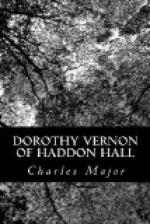As I went back to Madge I saw John ride out of the village by the south road. I afterward learned that he rode gloomily back to Rutland Castle cursing himself for a fool. His duty to his father, which with him was a strong motive, his family pride, his self love, his sense of caution, all told him that he was walking open-eyed into trouble. He had tried to remain away from the vicinity of Haddon Hall, but, despite his self-respect and self-restraint, he had made several visits to Rowsley and to Overhaddon, and at one time had ridden to Bakewell, passing Haddon Hall on his way thither. He had as much business in the moon as at Overhaddon, yet he told Dorothy he would be at the village every day, and she, it seemed, was only too willing to give him opportunities to transact his momentous affairs.
As the floating cloud to the fathomless blue, as the seed to the earth, as the iron to the lodestone, so was Dorothy unto John.
Thus you see our beautiful pitcher went to the well and was broken.
CHAPTER IV
THE GOLDEN HEART
The day after Dorothy’s first meeting with Manners at Overhaddon she was restless and nervous, and about the hour of three in the afternoon she mounted Dolcy and rode toward Bakewell. That direction, I was sure, she took for the purpose of misleading us at the Hall, and I felt confident she would, when once out of sight, head her mare straight for Overhaddon. Within an hour Dorothy was home again, and very ill-tempered.
The next day she rode out in the morning. I asked her if I should ride with her, and the emphatic “No” with which she answered me left no room for doubt in my mind concerning her desire for my company or her destination. Again she returned within an hour and hurried to her apartments. Shortly afterward Madge asked me what Dorothy was weeping about; and although in my own mind I was confident of the cause of Dorothy’s tears, I, of course, did not give Madge a hint of my suspicion. Yet I then knew, quite as well as I now know, that John, notwithstanding the important business which he said would bring him to Overhaddon every day, had forced himself to remain at home, and Dorothy, in consequence, suffered from anger and wounded pride. She had twice ridden to Overhaddon to meet him. She had done for his sake that which she knew she should have left undone, and he had refused the offering. A smarting conscience, an aching heart, and a breast full of anger were Dorothy’s rewards for her evil doing. The day after her second futile trip to Overhaddon, I, to test her, spoke of John. She turned upon me with the black look of a fury, and hurled her words at me.
“Never again speak his despised name in my hearing. Curse him and his whole race.”
“Now what has he been doing?” I asked.
“I tell you, I will not speak of him, nor will I listen to you,” and she dashed away from me like a fiery whirlwind.




